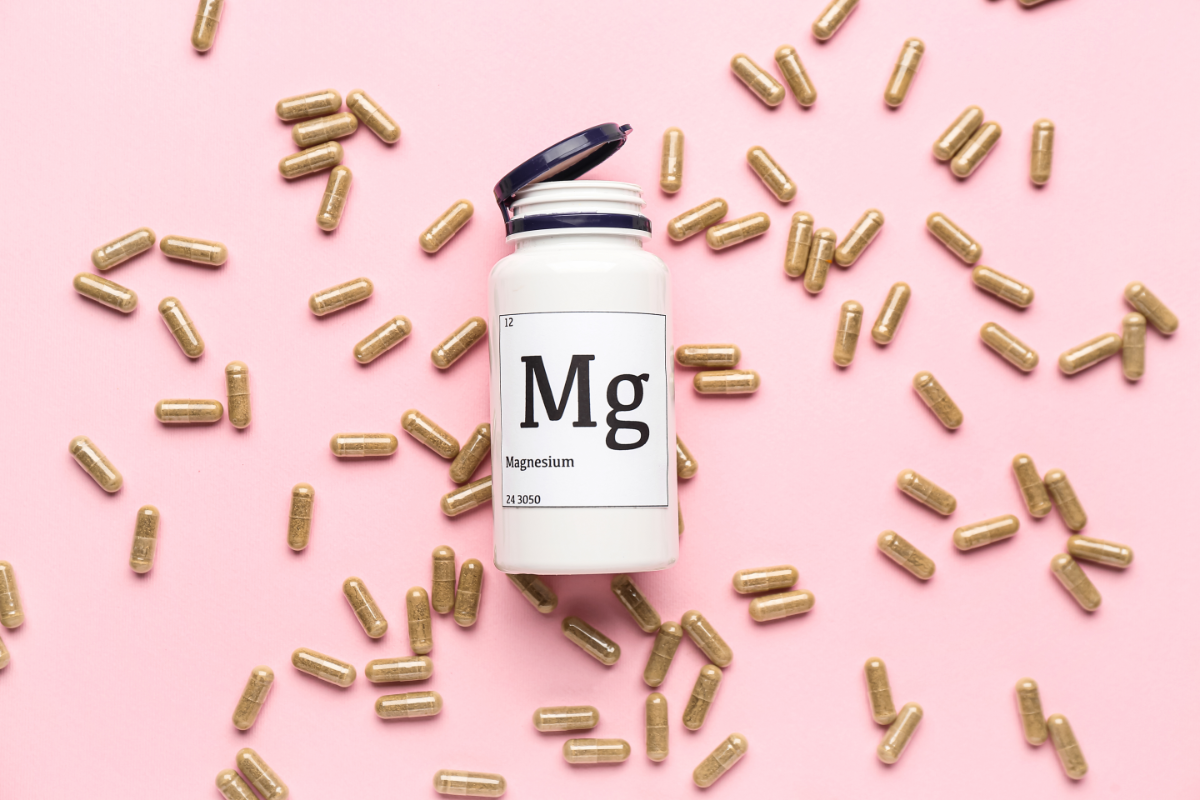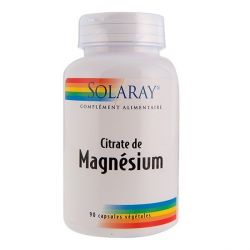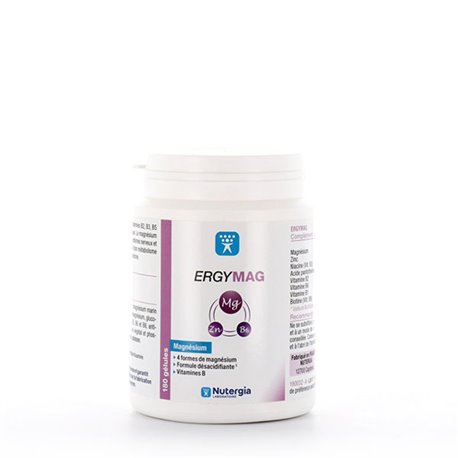Magnesium is involved in the proper functioning of a number of vital mechanisms: bone structure, nervous system, electrolyte balance, psychological balance, etc. Yet almost one person in five has a magnesium deficiency. The Recommended Dietary Allowance (RDA) for magnesium is 420 mg per day for men and 360 mg for women. Hence the importance of making up this magnesium deficit through our daily diet, but also by taking food supplements according to individual needs. Magnesium is recommended for everyone in cases of overwork and nervousness, and particularly for sportspeople, pregnant women and the elderly.
The benefits of magnesium for the body
Magnesium is an essential trace mineral for the body. It has a wide range of virtues and contributes to healthy metabolic function. In particular, its synergy with other nutrients provides a number of benefits. And this is true both for anatomical maintenance and for the prevention and treatment of various ailments. In fact, it contributes to the assimilation of nutrients in the body and catalyses numerous metabolic reactions. And it does so when it combines with elements such as calcium and phosphorus to bind them to tissues (bone, connective tissue, etc.). It also has an effect on muscle contraction and relaxation.
Without magnesium, the body would be unable to produceadenosine triphosphate (ATP). ATP is the most important energy agent that enables all metabolic processes to take place in the body. The trace element magnesium helps to regulate muscle contraction and relaxation.
By extension, magnesium helps regulate the heartbeat. At muscle level, in general, its relaxing effect gives it sedative properties. Magnesium also acts on the nervous system. It promotes the transmission of nerve impulses and brain plasticity. This significantly increases brain capacity, starting with memory. As well as being anti-allergic and anti-inflammatory, magnesium contributes to immune defence mechanisms. Thanks to its synergy with the body’s other nutrients and its enzymatic reactions, it strengthens the immune system.
Signs of magnesium deficiency
Our bodies contain around 25g of magnesium, making it the third most abundant mineral salt in the body, after calcium and phosphorus. More than 50% of this magnesium is stored in the bones, and the rest is found in the muscles, soft tissues and body fluids.
Magnesium contributes to the normal functioning of the nervous and muscular systems. In particular, it helps to reduce fatigue and asthenia. It is an essential mineral for the body, taking part in neuromuscular transmission and is considered a natural ‘anti-stress’.
Hypomagnesaemia is defined as a significant magnesium deficiency, i.e. a blood magnesium level of less than 0.70 mmol/L. This condition affects far more people than it appears. Yet the daily intake of magnesium by the body is essential to help the metabolism function properly, improve the synergy of essential nutrients and even stimulate the immune system.
Symptoms of magnesium deficiency
- Numbness
- Sensations of tingling and numbness
- Fatigue, insomnia, poor performance
- Headaches and migraines
- Agitation, difficulty concentrating, depressed mood
- Muscle cramps
- Concentration problems
Magnesium deficiency affects a large proportion of the population. The body cannot produce magnesium on its own and must obtain it from certain foods. It can happen that the nutritional intake is insufficient. This deficiency can lead to a variety of problems: stress, migraine, nausea, vomiting, asthenia, tetany, personality changes, rhythm disorders, etc.
These are the warning signs of a nutrient deficiency in your body. The only treatment for these ailments is a course of magnesium. To treat a magnesium deficiency, you need to include magnesium-rich foods in your diet. You can also take supplements with compounds such as magnesium citrate.
Daily magnesium requirements

The recommended intake of magnesium is 6 mg per kilo of body weight per day, i.e. an average of 360 mg for women and 420 mg for men. Teenagers and pregnant or breast-feeding women should increase this figure by 25 to 40 mg.
To encourage the body to function properly, daily magnesium intake should be equivalent, on average, to 6 mg per kilogram of body weight per day. However, certain individuals, such as sportsmen and women, adolescents, pregnant and breast-feeding women, the elderly and people under stress, should increase their intake. For example:
- A 70 kg man should consume 420 mg of magnesium per day.
- A woman weighing 55 kg should consume 330 mg of magnesium per day.
- A pregnant or breast-feeding woman of equivalent weight should consume 495 mg of magnesium per day, which implies a 50% increase in magnesium intake (9 mg per kilogram of weight per day).
Choosing your magnesium food supplements in the event of a deficiency
According to the SUVIMAX study, 3 out of 4 French people are below this RDA! Yet magnesium plays a fundamental role in the body’s functioning. That’s why it’s so important to make up the shortfall, through our daily diet, but also by taking additional doses according to individual needs.
The anti-fatigue magnesium cure
A magnesium cure is generally prescribed to combat certain metabolic disorders. From stress and insomnia to constipation (due to its osmotic action), it can be used to
prevention and treatment. It also has a significant effect on chronic fatigue. Magnesium deficiency increases sensitivity to stress and lack of sleep. So by regulating your magnesium intake, you can drastically reduce the effects of fatigue. The main source of magnesium is food. More specifically, foods rich in this trace element: legumes, brewer’s yeast, cereals, seeds, nuts or dark green leafy vegetables, etc
All of these are excellent sources of magnesium, so it’s a good idea to include them in your diet. Food supplements can also be used as an alternative cure. A dose of 300 mg per day is recommended. However, during medical treatment, this dosage can be increased to 1000g per day.
But beware of hypermagnesimia! In fact, in excessively high doses, its relaxing effects can have a negative impact on the body, especially in patients with kidney failure. Hypermagnesimia can lead to hypotension, respiratory depression and even cardiac arrest. It is therefore essential to be monitored by a health professional when undergoing this treatment.
How to choose your magnesium food supplement
In stressful situations, magnesium is over-consumed, so its reserves are depleted more quickly. To manage stress more effectively, without adversely affecting the balance of the body in the broadest sense, it is therefore advisable to boost magnesium intake with the help of magnesium-based food supplements or complexes including magnesium, plants and vitamins or other relevant active ingredients to enhance the benefits of this essential mineral.
Magnesium supplements are particularly useful for :
- People whose energy intake is reduced (due to a lack of appetite, or as part of a slimming diet), or who consume few foods with a high magnesium content (due to distaste or intolerance);
- Sportspeople, whose magnesium requirements may be increased by 10-20% depending on the type and intensity of their training;
- Anyone showing signs of magnesium deficiency: fatigue, low mood, anxiety, irritability, difficulty concentrating, muscular weakness, cramps.
- In cardiovascular prevention, many studies point in the direction of a good magnesium intake.
Different forms of magnesium available to the body
Magnesium citrate, magnesium aspartate, magnesium gluconate, magnesium glycerophosphate, magnesium hydroxide, magnesium oxide, magnesium glycinate, magnesium malate… First and foremost, it is important to note that not all forms of magnesium contain the same quantity of ‘elemental magnesium’, nor are they equally bioavailable.
Choosing your magnesium food supplement based on bioavailability and digestive tolerance
| Magnesium salt | Magnesium element content |
Bioavailability |
Tolerance
|
| Marine magnesium | 58 % | Average | Good |
| Magnesium citrate | 11 % | Good | Good |
| Magnesium carbonate | 25 % | Average | Medium |
| Magnesium bisglycinate | 18 % | Excellent thanks to aminocomplexes | Excellent |
– Marine magnesium :
A form of magnesium that is as natural as possible and therefore guaranteed to be additive-free. Marine magnesium is less available than certain highly assimilable forms of magnesium, but it remains an excellent reference for all those who want to boost their daily intake. Its action can, if necessary, be enhanced by the combination of co-factors, such as vitamin B6. Whether chosen pure or in combination with complementary vitamins and minerals, marine magnesium is an ideal partner for well-being, particularly in cases of intense stress.
– Magnesium citrate:
Composed of magnesium and citrate, otherwise known as citric acid, which is found in lemons. Magnesium citrate has excellent bioavailability, as citrate promotes the absorption of magnesium by increasing its solubility. Magnesium citrate is a magnesium that is very well assimilated by the body.
– Magnesium carbonate:
Naturally present in the form of magnesite and associated with calcium carbonate in dolomite. It is mainly used to prepare magnesium oxide and magnesium. Carbonate is one of the least interesting magnesium salts because of its poor bioavailability (ability to release its active principle).
– Magnesium bisglycinate:
Composed of magnesium and glycine, an amino acid that offers a fat-soluble form that is better assimilated by the intestinal wall. Chelated forms of magnesium, such as glycinate, bisglycinate and taurinate, as well as glycerophosphate, are very interesting because they are very well tolerated and perfectly assimilated, so there is little disruption to transit. The only drawback is that they are expensive.
– The combination of magnesium and rhodiola:
Recommended for sportsmen and women and people who are physically active.
– Magnesium chloride:
Magnesium chloride salts are also highly beneficial: used as part of a bath, they have a positive impact on muscles, the mind and detoxifying the body; applied locally as a compress or spray, they soothe redness, irritation and small skin imperfections while supporting skin regeneration.
|
|
|
|
|
|
|
|
|
 |
|
 |
|
Precautions for use with magnesium supplements
- Precautions in the event of magnesium deficiency: Even a slight deficiency increases the risk of cardiovascular disease and diabetes. It can also cause spasmophilia or allergies, and reduce resistance to infection. A severe deficiency can lead to cardiac arrhythmia, fatigue, depression, muscle cramps, even convulsions, irritability and mental confusion.
- Caution with excess intake: Excess magnesium can cause diarrhoea and nausea. In the case of kidney damage, when the body is unable to eliminate the surplus through the urine, muscle weakness, lethargy, confusion and breathing difficulties are observed. But this overdose only occurs with poorly controlled supplementation.
- For more information, do not hesitate to ask your health practitioner for advice on the right magnesium dosage for your health situation.
Naturopathic advice for your magnesium cure
- A migraine attack or a nasty stiff neck? A high dose of magnesium can help. Think about it! Magnesium is also very useful for women suffering from menstrual pain.
- Before resuming sport or after strenuous activity, a course of magnesium is essential.
- A few weeks before exams, a course of magnesium lasting at least 2 months will reduce your stress threshold and help you to manage both physical and psychological fatigue.
Sources
- 1- https://pubmed.ncbi.nlm.nih.gov/7836621/
- 2- https://www.nutergia.com/fr/nutergia-votre-expert-conseil/les-nutriments/magnesium.php
- 3- https://fr.wikipedia.org/wiki/SU.VI.MAX
- 4- https://www.doctissimo.fr/html/nutrition/vitamines_mineraux/oligotherapie/nu_7160_magnesium_anti_stress_naturel.htm








